高级英语1课文 翻译
高级英语第一册课文翻译_张汉熙版
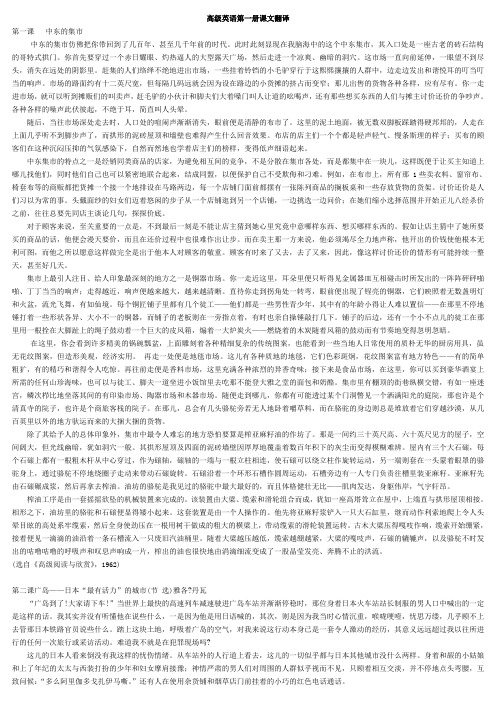
高级英语第一册课文翻译第一课中东的集市中东的集市仿佛把你带回到了几百年、甚至几千年前的时代。
此时此刻显现在我脑海中的这个中东集市,其入口处是一座古老的砖石结构的哥特式拱门。
你首先要穿过一个赤日耀眼、灼热逼人的大型露天广场,然后走进一个凉爽、幽暗的洞穴。
这市场一直向前延伸,一眼望不到尽头,消失在远处的阴影里。
赶集的人们络绎不绝地进出市场,一些挂着铃铛的小毛驴穿行于这熙熙攘攘的人群中,边走边发出和谐悦耳的叮当叮当的响声。
市场的路面约有十二英尺宽,但每隔几码远就会因为设在路边的小货摊的挤占而变窄;那儿出售的货物各种各样,应有尽有。
你一走进市场,就可以听到摊贩们的叫卖声,赶毛驴的小伙计和脚夫们大着嗓门叫人让道的吆喝声,还有那些想买东西的人们与摊主讨价还价的争吵声。
各种各样的噪声此伏彼起,不绝于耳,简直叫人头晕。
随后,当往市场深处走去时,人口处的喧闹声渐渐消失,眼前便是清静的布市了。
这里的泥土地面,被无数双脚板踩踏得硬邦邦的,人走在上面几乎听不到脚步声了,而拱形的泥砖屋顶和墙壁也难得产生什么回音效果。
布店的店主们一个个都是轻声轻气、慢条斯理的样子;买布的顾客们在这种沉闷压抑的气氛感染下,自然而然地也学着店主们的榜样,变得低声细语起来。
中东集市的特点之一是经销同类商品的店家,为避免相互间的竞争,不是分散在集市各处,而是都集中在一块儿,这样既便于让买主知道上哪儿找他们,同时他们自己也可以紧密地联合起来,结成同盟,以便保护自己不受欺侮和刁难。
例如,在布市上,所有那 1些卖衣料、窗帘布、椅套布等的商贩都把货摊一个接一个地排设在马路两边,每一个店铺门面前都摆有一张陈列商品的搁板桌和一些存放货物的货架。
讨价还价是人们习以为常的事。
头戴面纱的妇女们迈着悠闲的步子从一个店铺逛到另一个店铺,一边挑选一边问价;在她们缩小选择范围并开始正儿八经杀价之前,往往总要先同店主谈论几句,探探价底。
对于顾客来说,至关重要的一点是,不到最后一刻是不能让店主猜到她心里究竟中意哪样东西、想买哪样东西的。
(完整word版)高级英语第一册课文翻译及词汇
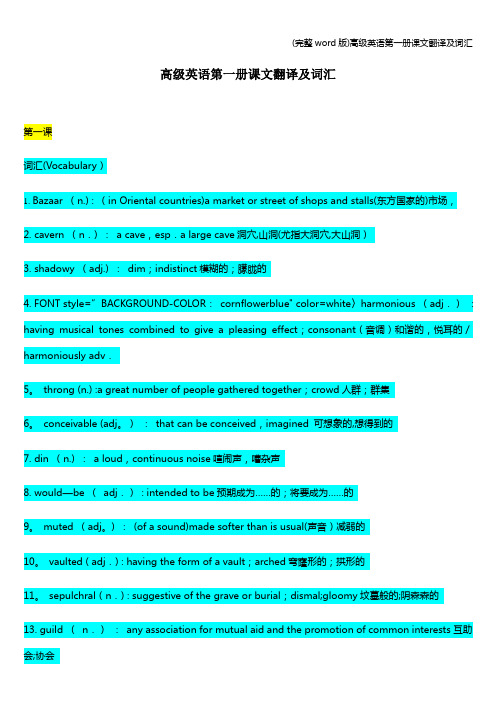
高级英语第一册课文翻译及词汇第一课词汇(Vocabulary)1.Bazaar (n.) : (in Oriental countries)a market or street of shops and stalls(东方国家的)市场,2. cavern (n.) :a cave,esp.a large cave洞穴,山洞(尤指大洞穴,大山洞)3. shadowy (adj.) :dim;indistinct模糊的;朦胧的4. FONT style=”BACKGROUND-COLOR:cornflowerblue" color=white〉harmonious (adj.):having musical tones combined to give a pleasing effect;consonant(音调)和谐的,悦耳的/harmoniously adv.5。
throng (n.) :a great number of people gathered together;crowd人群;群集6。
conceivable (adj。
):that can be conceived,imagined 可想象的,想得到的7. din (n.) :a loud,continuous noise喧闹声,嘈杂声8. would—be (adj.): intended to be预期成为……的;将要成为……的9。
muted (adj。
) :(of a sound)made softer than is usual(声音)减弱的10。
vaulted ( adj.) : having the form of a vault;arched穹窿形的;拱形的11。
sepulchral(n.) : suggestive of the grave or burial;dismal;gloomy坟墓般的;阴森森的13. guild (n.):any association for mutual aid and the promotion of common interests互助会;协会14. trestle (n。
高级英语第一册 课文翻译及修辞
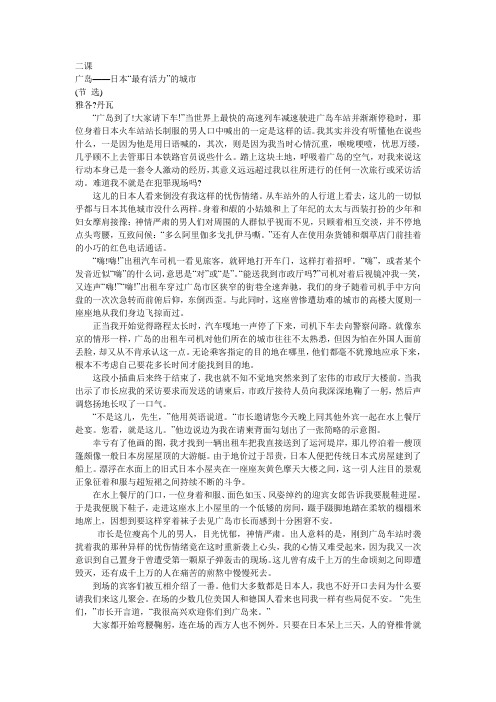
二课广岛——日本“最有活力”的城市(节选)雅各?丹瓦“广岛到了!大家请下车!”当世界上最快的高速列车减速驶进广岛车站并渐渐停稳时,那位身着日本火车站站长制服的男人口中喊出的一定是这样的话。
我其实并没有听懂他在说些什么,一是因为他是用日语喊的,其次,则是因为我当时心情沉重,喉咙哽噎,忧思万缕,几乎顾不上去管那日本铁路官员说些什么。
踏上这块土地,呼吸着广岛的空气,对我来说这行动本身已是一套令人激动的经历,其意义远远超过我以往所进行的任何一次旅行或采访活动。
难道我不就是在犯罪现场吗?这儿的日本人看来倒没有我这样的忧伤情绪。
从车站外的人行道上看去,这儿的一切似乎都与日本其他城市没什么两样。
身着和嘏的小姑娘和上了年纪的太太与西装打扮的少年和妇女摩肩接豫;神情严肃的男人们对周围的人群似乎视而不见,只顾着相互交淡,并不停地点头弯腰,互致问候:“多么阿里伽多戈扎伊马嘶。
”还有人在使用杂货铺和烟草店门前挂着的小巧的红色电话通话。
“嗨!嗨!”出租汽车司机一看见旅客,就砰地打开车门,这样打着招呼。
“嗨”,或者某个发音近似“嗨”的什么词,意思是“对”或“是”。
“能送我到市政厅吗?”司机对着后视镜冲我一笑,又连声“嗨!”“嗨!”出租车穿过广岛市区狭窄的街巷全速奔驰,我们的身子随着司机手中方向盘的一次次急转而前俯后仰,东倒西歪。
与此同时,这座曾惨遭劫难的城市的高楼大厦则一座座地从我们身边飞掠而过。
正当我开始觉得路程太长时,汽车嘎地一声停了下来,司机下车去向警察问路。
就像东京的情形一样,广岛的出租车司机对他们所在的城市往往不太熟悉,但因为怕在外国人面前丢脸,却又从不肯承认这一点。
无论乘客指定的目的地在哪里,他们都毫不犹豫地应承下来,根本不考虑自己要花多长时间才能找到目的地。
这段小插曲后来终于结束了,我也就不知不觉地突然来到了宏伟的市政厅大楼前。
当我出示了市长应我的采访要求而发送的请柬后,市政厅接待人员向我深深地鞠了一躬,然后声调悠扬地长叹了一口气。
高中英语必修1_课文翻译

高中英语必修1 课文翻译第一单元友谊Reading安妮最好的朋友你是不是想有一位无话不谈能推心置腹的朋友呢?或者你是不是担心你的朋友会嘲笑你,会不理解你目前的困境呢?安妮?弗兰克想要的是第一种类型的朋友,于是她就把日记档成了她最好的朋友。
安妮在第二次世界大战期间住在荷兰的阿姆斯特丹。
她一家人都是犹太人,所以他们不得不躲藏起来,否则他们就会被德国纳粹抓去。
她和她的家人躲藏了两年之后才被发现。
在这段时间里,她唯一的忠实朋友就是她的日记了。
她说,“我不愿像大多数人那样在日记中记流水账。
我要把这本日记当作我的朋友,我要把我这个朋友称作基蒂”。
安妮自从1942年7月起就躲藏在那儿了,现在,来看看她的心情吧。
1944年6月15日星期四亲爱的基蒂:我不知道这是不是因为我长久无法出门的缘故,我变得对一切与大自然有关的事物都无比狂热。
我记得非常清楚,以前,湛蓝的天空、鸟儿的歌唱、月光和鲜花,从未令我心迷神往过。
自从我来到这里,这一切都变了。
……比方说,有天晚上天气很暖和,我熬到11点半故意不睡觉,为的是独自好好看看月亮。
但是因为月光太亮了,我不敢打开窗户。
还有一次,就在五个月以前的一个晚上,我碰巧在楼上,窗户是开着的。
我一直等到非关窗不可的时候才下楼去。
漆黑的夜晚,风吹雨打,雷电交加,我全然被这种力量镇住了。
这是我一年半以来第一次目睹夜晚…………令人伤心的是……我只能透过脏兮兮的窗帘观看大自然,窗帘悬挂在沾满灰尘的窗前,但观看这些已经不再是乐趣,因为大自然是你必须亲身体验的。
你的安妮Using LanguageReading and亲爱的王小姐:我同班上的同学有件麻烦事。
我跟我们班里的一位男同学一直相处很好,我们常常一起做家庭作业,而且很乐意相互帮助。
我们成了非常好的朋友。
可是,其他同学却开始在背后议论起来,他们说我和这位男同学在谈恋爱,这使我很生气。
我不想中断这段友谊,但是我又讨厌人家背后说闲话。
我该怎么办呢?莉萨Reading and writing尊敬的编辑:我是湖州高中的一名学生。
《高级英语》课文逐句翻译(1)
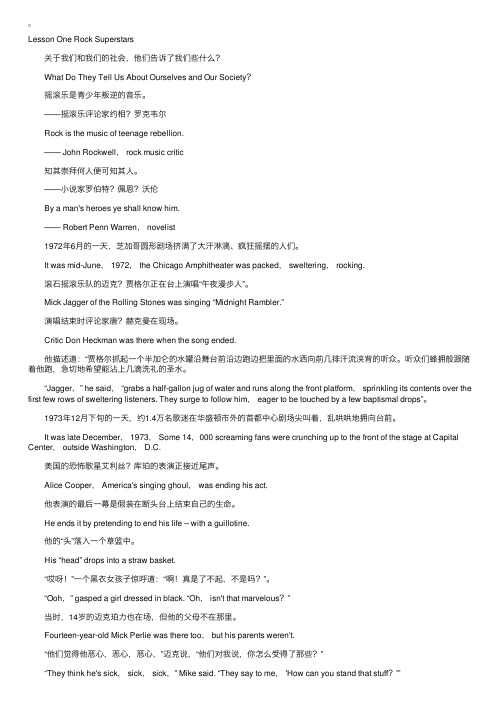
Lesson One Rock Superstars 关于我们和我们的社会,他们告诉了我们些什么? What Do They Tell Us About Ourselves and Our Society? 摇滚乐是青少年叛逆的⾳乐。
——摇滚乐评论家约相?罗克韦尔 Rock is the music of teenage rebellion. —— John Rockwell, rock music critic 知其崇拜何⼈便可知其⼈。
——⼩说家罗伯特?佩恩?沃伦 By a man's heroes ye shall know him. —— Robert Penn Warren, novelist 1972年6⽉的⼀天,芝加哥圆形剧场挤满了⼤汗淋漓、疯狂摇摆的⼈们。
It was mid-June, 1972, the Chicago Amphitheater was packed, sweltering, rocking. 滚⽯摇滚乐队的迈克?贾格尔正在台上演唱“午夜漫步⼈”。
Mick Jagger of the Rolling Stones was singing “Midnight Rambler.” 演唱结束时评论家唐?赫克曼在现场。
Critic Don Heckman was there when the song ended. 他描述道:“贾格尔抓起⼀个半加仑的⽔罐沿舞台前沿边跑边把⾥⾯的⽔洒向前⼏排汗流浃背的听众。
听众们蜂拥般跟随着他跑,急切地希望能沾上⼏滴洗礼的圣⽔。
“Jagger,” he said, “grabs a half-gallon jug of water and runs along the front platform, sprinkling its contents over the first few rows of sweltering listeners. They surge to follow him, eager to be touched by a few baptismal drops”。
高级英语第一册课后翻译
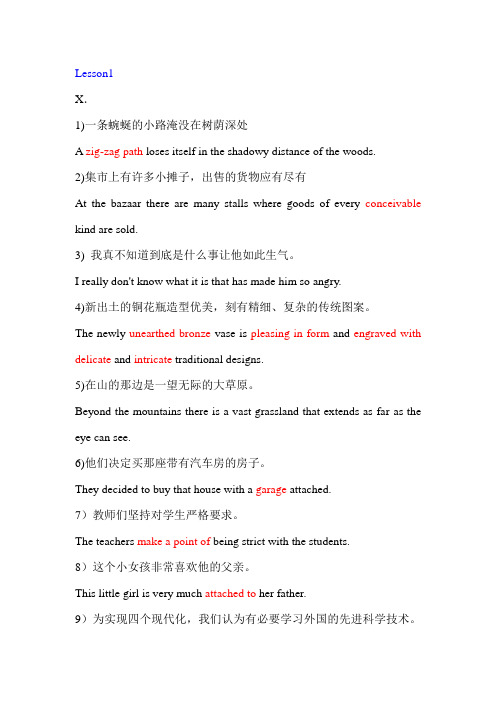
Lesson1X.1)一条蜿蜒的小路淹没在树荫深处A zig-zag path loses itself in the shadowy distance of the woods.2)集市上有许多小摊子,出售的货物应有尽有At the bazaar there are many stalls where goods of every conceivable kind are sold.3) 我真不知道到底是什么事让他如此生气。
I really don't know what it is that has made him so angry.4)新出土的铜花瓶造型优美,刻有精细、复杂的传统图案。
The newly unearthed bronze vase is pleasing in form and engraved with delicate and intricate traditional designs.5)在山的那边是一望无际的大草原。
Beyond the mountains there is a vast grassland that extends as far as the eye can see.6)他们决定买那座带有汽车房的房子。
They decided to buy that house with a garage attached.7)教师们坚持对学生严格要求。
The teachers make a point of being strict with the students.8)这个小女孩非常喜欢他的父亲。
This little girl is very much attached to her father.9)为实现四个现代化,我们认为有必要学习外国的先进科学技术。
To achieve the four modernization, we make a point of learning from the advanced science and technology of other countries.10)黄昏临近时,天渐渐地暗下来了。
高级英语第一册马克吐温课文翻译以及词汇

在大多数美国人的心目中,马克•吐温是位伟大作家,他描写了哈克•费恩永恒的童年时代中充满诗情画意的旅程和汤姆•索亚在漫长的夏日里自由自在历险探奇的故事。
的确,这位美国最受人喜爱的作家的探索精神、爱国热情、浪漫气质及幽默笔调都达到了登峰造极的程度。
但我发现还有另一个不同的马克•吐温——一个由于深受人生悲剧的打击而变得愤世嫉俗、尖酸刻薄的马克•吐温,一个为人类品质上的弱点而忧心忡忡、明显地看到前途是一片黑暗的人。
印刷工、领航员、邦联游击队员、淘金者、耽于幻想的乐天派、语言尖刻的讽刺家:马克•吐温原名塞缪尔•朗赫恩•克莱门斯,他一生之中有超过三分之一的时间浪迹美国各地,体验着美国的新生活,尔后便以作家和演说家的身分将他所感受到的这一切介绍给全世界。
他的笔名取自他在蒸汽船上做工时听到的报告水深为两口寻(12英尺)——意即可以通航的信号语。
他的作品中有二十几部至今仍在印行,其外文译本仍在世界各地拥有读者,由此可见他的享誉程度。
在马克•吐温青年时代,美国的地理中心是密西西比河流域,而密西西比河是这个年轻国家中部的交通大动脉。
龙骨船、平底船和大木筏载运着最重要的商品。
木材、玉米、烟草、小麦和皮货通过这些运载工具顺流而下,运送到河口三角洲地区,而砂糖、糖浆、棉花和威士忌酒等货物则被运送到北方。
在19世纪50年代,西部领土开发高潮到来之前,辽阔的密西西比河流域占美国已开发领土的四分之三。
1857年,少年马克•吐温作为蒸汽船上的一名小领航员踏人了这片天地。
在这个新的工作岗位上,他接触到的是各式各样的人物,看到的是一个多姿多彩的大干世界。
他完全地投身到这种生活之中,经常在操舵室里听着人们谈论民间争斗、海盗抢劫、私刑案件、游医卖药以及河边的一些化外民居的故事。
所有这一切,连同他那像留声机般准确可靠的记忆所吸收的丰富多彩的语言,后来都有机会在他的作品中得以再现。
蒸汽船的甲板上不仅挤满了富有开拓精神的人们,而且也载着一些娼妓、赌棍和歹徒等社会渣滓。
高级英语第一册课文翻译和词汇

高级英语(第三版)第一册课文译文和词汇张汉熙版Lesson 2 Hiroshima - The "Liveliest" City in Japan(experts)广岛--日本“最有活力”的城市(节选) 雅各•丹瓦“广岛到了!大家请下车!”当世界上最快的高速列车减速驶进广岛车站并渐渐停稳时,那位身着日本火车站站长制服的男人口中喊出的一定是这样的话。
我其实并没有听懂他在说些什么,一是因为他是用日语喊的,其次,则是因为我当时心情沉重,喉咙哽噎,忧思万缕,几乎顾不上去管那日本铁路官员说些什么。
踏上这块土地,呼吸着广岛的空气,对我来说这行动本身已是一套令人激动的经历,其意义远远超过我以往所进行的任何一次旅行或采访活动。
难道我不就是在犯罪现场吗?这儿的日本人看来倒没有我这样的忧伤情绪。
从车站外的人行道上看去,这儿的一切似乎都与日本其他城市没什么两样。
身着和嘏的小姑娘和上了年纪的太太与西装打扮的少年和妇女摩肩接豫;神情严肃的男人们对周围的人群似乎视而不见,只顾着相互交淡,并不停地点头弯腰,互致问候:“多么阿里伽多戈扎伊马嘶。
”还有人在使用杂货铺和烟草店门前挂着的小巧的红色电话通话。
“嗨!嗨!”出租汽车司机一看见旅客,就砰地打开车门,这样打着招呼。
“嗨”,或者某个发音近似“嗨”的什么词,意思是“对”或“是”。
“能送我到市政厅吗?”司机对着后视镜冲我一笑,又连声“嗨!”“嗨!”出租车穿过广岛市区狭窄的街巷全速奔驰,我们的身子随着司机手中方向盘的一次次急转而前俯后仰,东倒西歪。
与此同时,这座曾惨遭劫难的城市的高楼大厦则一座座地从我们身边飞掠而过。
正当我开始觉得路程太长时,汽车嘎地一声停了下来,司机下车去向警察问路。
就像东京的情形一样,广岛的出租车司机对他们所在的城市往往不太熟悉,但因为怕在外国人面前丢脸,却又从不肯承认这一点。
无论乘客指定的目的地在哪里,他们都毫不犹豫地应承下来,根本不考虑自己要花多长时间才能找到目的地。
- 1、下载文档前请自行甄别文档内容的完整性,平台不提供额外的编辑、内容补充、找答案等附加服务。
- 2、"仅部分预览"的文档,不可在线预览部分如存在完整性等问题,可反馈申请退款(可完整预览的文档不适用该条件!)。
- 3、如文档侵犯您的权益,请联系客服反馈,我们会尽快为您处理(人工客服工作时间:9:00-18:30)。
Unit One English and American Concepts of Space
Edward T. Hall
英国人和美国人的空间概念
人们说英国人和美国人是被同一种语言分离开的两个伟大的民族。
英美民族之间的差异使得英语本身受到很多指责,然而,这些差异也许不应该过分归咎于语言,而应该更多的归因于其他层面上的交流:从使很多美国人感到做作的英式语音语调到以自我为中心的处理时间、空间和物品的不同方法。
如果说这世上有两种文化间的空间关系学的具体内容迥然不同,那就是在有教养(私立学校)的英国人和中产阶级的美国人之间了。
造成这种巨大差异的一个基本原因是在美国人们借助空间大小来对人或事加以分类,而在英国决定你身分的却是社会等级制度。
在美国,你的住址可以很好的暗示你的身分(这不仅适用于你的家庭住址,也适用于你的商业地址)。
住在纽波特和棕榈滩的人要比布鲁克林和迈阿密的人高贵时髦得多。
格林尼治和科德角与纽华克和迈阿密简直毫无类似之处。
座落在麦迪逊大道和花园大道的公司要比那些座落在第七大道和第八大道的公司更有情调。
街角办公室要比电梯旁或者长廊尽头的办公室更受尊敬。
而英国人是在社会等级制度下出生和成长的。
无论你在哪里看到他,他仍然是贵族,即便是在鱼贩摊位的柜台后面。
除了阶级差异,英国人和我们美国人在如何分配空间上也存在差异。
在美国长大的中产阶级美国人觉得自己有权拥有自己的房间,或者至少房间的一部分。
当我让我的美国研究对象画出自己理想的房间或办公室时,他们毫无例外的只画了自己的空间,而没有画其他人的地方。
当我要求他们画出他们现有的房间或办公室时,他们只画出他们共享房间里自己的那部分,然后在中间画一条分隔线。
无论是男性还是女性研究对象,都把厨房和主卧划归母亲或妻子的名下,而父亲的领地则是书房或休息室,如果有的话;要不然就是工场,地下室,或者有时仅仅是一张工作台或者是车库。
美国女性如果想独处,可以走进卧室、关上门。
关闭的门是“不要打扰”或“我很生气”的标志。
如果一个美国人家里或办公室的房门是开着的,则说明他现在有空。
在这样的暗示下,人们不会认为他想把自己关闭起来,而会认为他正处于一种随时响应他人的准备就绪的状态中。
关闭的门是用于会议、私人会谈、生意往来、需要集中精力的工作、学习、休息、睡觉、穿衣服和性的。
相比之下,中产阶级和上流阶级的英国人从小是在和兄弟姐妹共享的儿童室里长大的。
最大的孩子一般独占一个房间,直到他9岁10岁左右去上寄宿学校时再空出来。
拥有自己的房间和很早就习惯于共享房间之间的差异似乎并无重大意义,但这却对英国人对待自己空间的态度有着重大的影响。
一个英国人可能从来都不曾有过永久的属于自己的房间,他也很少会去企盼或者认为自己应该有权拥有这样的房间。
即使是下议院的议员也没有自己的办公室,他们通常在俯瞰泰晤士河的阳台上处理事务。
所以英国人会对美国人需要一个安稳的地方去工作(即办公室)这样的需求感到困惑不解。
在英国工作的美国人如果没得到他们认为适当的封闭的工作空间,也许会非常生气。
就出于保护自我的目的而将墙壁作为屏蔽物的需求而言,美国人应位列德国人和英国人之间。
英国人和美国人的行为特点之间的显著差别有着极其重要的意义,尤其是在我们假设人和其他动物一样,有时也有一种内在的封闭自己的需求的情况下。
我的研讨班的一个学生生动的刻画了当这种看不见的行为特点之间产生冲突时可能发生的情状。
很显然他在和美国人交往中承受了很大的压力。
仿佛没有什么是正常的,而且从他的评论里可以清楚地了解到他认为我们美国人不知道如何举止得体。
通过分析他的抱怨,我们发现他烦闷的一个根源是似乎没有哪个美国人能够辨别出这样的细微的暗示:即有时他不想让别人扰乱他的思绪。
正如他自己所说的:“我在公寓里漫步,好像每次当我想独处的时候我的室友就会和我搭话。
很快他就在问‘你怎么了?’而且想知道我是否生气了。
这时我真的生气了,然后就会冲他说些什么。
”
尽管需要花费一些时间,但最终我们还是能够分辨出在这个事例的冲突中,美国人和英国人各自所遇到的不同的麻烦,以及这些特征之间的明显差别。
当美国人想独处时,他会进到自己的房间里并且关上门——他借助于建筑物来屏蔽他人。
对美国人来说,拒绝同在场的人谈话,对其采取“冷处理”,是最极端的拒绝形式,同时也是非常不高兴的明显的表示。
而另一方面,英国人由于从小就没有自己的房间,从来
没有利用空间作为躲避他人的避难所的习惯。
他们实际上在潜意识里设立了一系列的屏障,他们认为这些屏障其他人应该能够理解或辨别。
因此,当英国人和美国人在一起时,他越不想和这个美国人说话,这个美国人就越可能找他说话,因为他想确保一切正常。
这种冲突会一直持续下去,直到这两个人开始互相了解彼此。
重要的是双方对空间和建筑的需求并不一样。
Paraphrase
1. The differences for which language gets blamed may not be due so much to words as to communications on other levels beginning with English intonation (which sounds affected to many Americans) and continuing to ego-linked ways of handling time, space, and materials.
--- Some people complain about the English language for its being so different in the two countries. These differences, however, may have resulted not from the words people use, but rather from individual linguistic habits, which are displayed in the adoption of a particular intonation (English intonation sounds unnatural to Americans), and extend down to the way people look at the world.
2. One of the basic reasons for this wide disparity is that in the United States we use space as a way of classifying people and activities, whereas in England it is the social system that determines who you are.
--- One of the important factors that has contributed to such a big difference is that the place where one lives, to Americans, can present a symbol of one’s status or activity, whi le in England, the class one belongs to identifies one’s position in society.
3. As a consequence, the English are puzzled by the American need for a secure place in which to work, an office.
--- As a result, it is hard for the English to figure out why Americans invariably feel it is necessary to find themselves a space, such as an office, where they may work without being disturbed.
4. It took some time but finally we were able to identify most of the contrasting features of the American and British problems that were in conflict in this case.
--- It was not until some time later that we managed to discover the major differences that had frustrated both sides in the above story.
5. They have in effect internalized a set of barriers, which they erect and which others are supposed to recognize.
They have virtually built up, for themselves, a wall, which may keep them safe from disturbance when necessary and which, they assume, others should be able to perceive and respect.。
